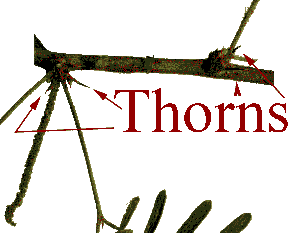

 Honey? Mesquite
Honey? MesquiteTo some Indian tribes they were such an important food item they named the months by the stage of the mesquite. They would eat the buds, flowers and pods. The bean pods ripen between July and September. The seeds themselves are VERY hard, so the pod is the part eaten.
One of the biggest destroyers of mesquite is the Beef industry, because ranchers want the water to grow grasses for the cattle. So they destroy these nutrition laden bushes. (This industry has driven many other plants to near extinction usually because of lack of knowledge.)

2 tablespoons butter 1 cup mesquite broth
3 cups sliced carrots
½ cup chopped onion 1 cup whole milk
1 large clove garlic, minced Fresh ground white pepper
½ cup water
In a large saucepan with a lid, melt the butter. Quickly sauté the carrot, onion, and garlic. Add the water, cover the pan, and simmer until tender. Puree carrots in blender or food processor. Return to saucepan. Add mesquite broth and milk. Season with fresh ground white pepper. Heat. Recipe is easily doubled.
This sweet, caramel-like broth is the basis for many delicious recipes.
4 cups broken mesquite pods 8 cups water
Place the broken mesquite pods in a large pot, cover with the 8 cups of water, cover, and boil for one hour. Cool. Wring and tear the pods in the broth, stirring and mashing the sweet pith into the liquid. Or put one cup of the pods and just a little of the broth into a food processor fitted with a steel blade and whirl until the pods are shredded. Repeat until all pods are shredded. Return the material to the broth and stir. The object is to get as much of the pulp into the broth as possible. Drain off the liquid and discard the fiber. Simmer the liquid uncovered until reduced to 3 cups.
